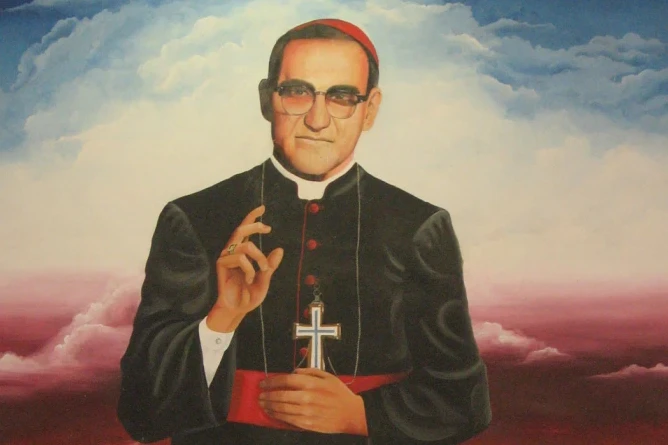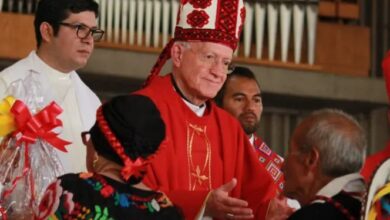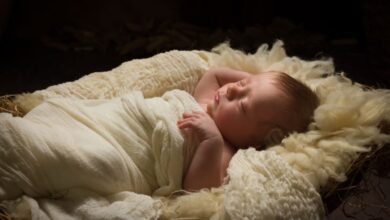Nunciature in El Salvador issues correction for liturgical abuse

 Mural of Archbishop Oscar Romero, / Credit: Douglas Radamez Barahona, Giovani Ascencio Ardón and Raul Lemus- Grupo Cinteupiltzin CENAR El Salvador (CC BY-SA 3.0).
Mural of Archbishop Oscar Romero, / Credit: Douglas Radamez Barahona, Giovani Ascencio Ardón and Raul Lemus- Grupo Cinteupiltzin CENAR El Salvador (CC BY-SA 3.0). ACI Prensa Staff, Mar 29, 2025 / 08:00 am (CNA).
The apostolic nunciature in El Salvador issued a correction for the irregularities that occurred March 24 during a Mass marking the 45th anniversary of the assassination of St. Oscar Romero, who served as archbishop of San Salvador during that country’s civil war.
The Mass, held in the chapel where Romero was assassinated while celebrating Mass on March 24, 1980, included the unauthorized presence of a female Anglican bishop at the altar and banners in opposition to proposed gold mining, violating Catholic liturgical norms.
In several photos released by Salvadoran media, a female Anglican bishop can be seen behind the altar along with the bishop of the Salvadoran Old Catholic Church and anti-mining activist Neftalí Ruiz; the celebrating bishop, Oswaldo Estefano Escobar Aguilar; and Raúl Vera, bishop emeritus of Saltillo, Mexico.
In some of the photos, banners can also be seen in front of the altar with slogans such as “Every mine pollutes. No to mining, yes to life” and “Freedom for environmental defenders.”
Statement of nunciature in El Salvador
In a statement released after the Mass on the same day, March 24, the apostolic nunciature in El Salvador reminded that “ecumenical celebrations shared with members of non-Catholic churches include only the Liturgy of the Word and its commentary, along with prayers of the faithful and the prayer that Our Lord taught us: the Our Father.”
Furthermore, and according to liturgical norms, the text continues, “it must be taken into account that the altar is reserved solely for the Eucharistic celebration.”
“What happened this morning in the Chapel of the Hospitalito should not have taken place because it is prohibited by ecclesiastical law,” the statement concludes.
Sources from the Archdiocese of San Salvador who asked not to be identified told ACI Prensa, CNA’s Spanish-language news partner, that the banners were unauthorized and that they were placed at the end of the Mass. Regarding the presence of the Anglican “female bishop” and anti-mining activist Ruiz, the archdiocese emphasized that the nunciature had already issued a statement on the matter.
ACI Prensa contacted the office of the archbishop of San Salvador, José Luis Escobar, the following day on March 25 to inquire about the irregularities at the March 24 Mass. In an email, his secretary responded that “unfortunately, the archbishop had more commitments than he had planned and will be out of town, so we apologize for not being able to assist with the request.”
Canon 908 of the Code of Canon Law, the law that regulates the universal Church, states that “Catholic priests are forbidden to concelebrate the Eucharist with priests or ministers of churches or ecclesial communities which do not have full communion with the Catholic Church.”
Additionally, Canon 844 emphasizes that “Catholic ministers administer the sacraments licitly to Catholic members of the Christian faithful alone, who likewise receive them licitly from Catholic ministers alone.”
In February, a female Anglican minister “concelebrated” a Mass for the installation of the archbishop of the Archdiocese of Chapecó in Brazil.
Tensions between Church, Bukele over mining
The controversy that arose during the commemorative Mass for the 45th anniversary of the assassination of St. Oscar Romero reflects current tensions in El Salvador, particularly around the metal mining law promoted by President Nayib Bukele.
The presence of anti-mining banners and non-Catholic religious figures at the altar during the celebration served to highlight opposition to the government initiative.
On March 19, the bishops of El Salvador presented a letter to the Legislative Assembly, supported by 150,000 signatures, seeking the repeal of the Metallic Mining Law. Mining had been banned in the country since 2017 but approved in December 2024 with the support of Bukele.
In December 2024, Bukele called the ban absurd, because the wealth given by God “can be used responsibly” to achieve high economic and social development.
The president said on his X account that “studies carried out in only 4% of the potential area identified 50 million ounces of gold, valued today at $ 131.565 billion. This is equivalent to 380% of El Salvador’s GDP.”
However, the bishops fear that these activities will increase “water and air pollution … irreversibly causing death and illness,” especially among the poor.
This story was first published by ACI Prensa, CNA’s Spanish-language news partner. It has been translated and adapted by CNA.




